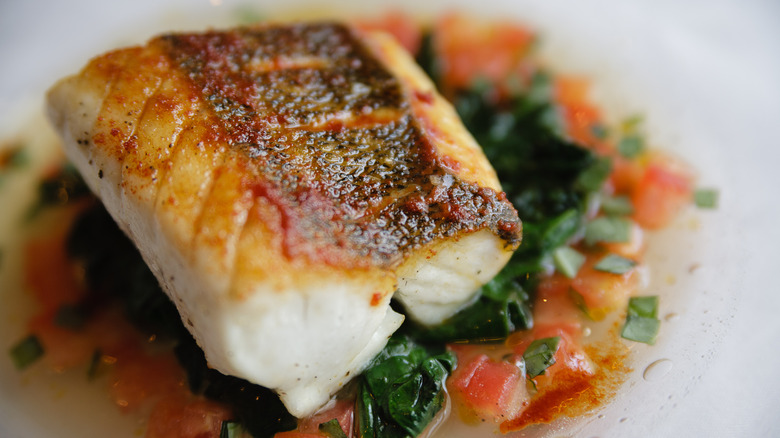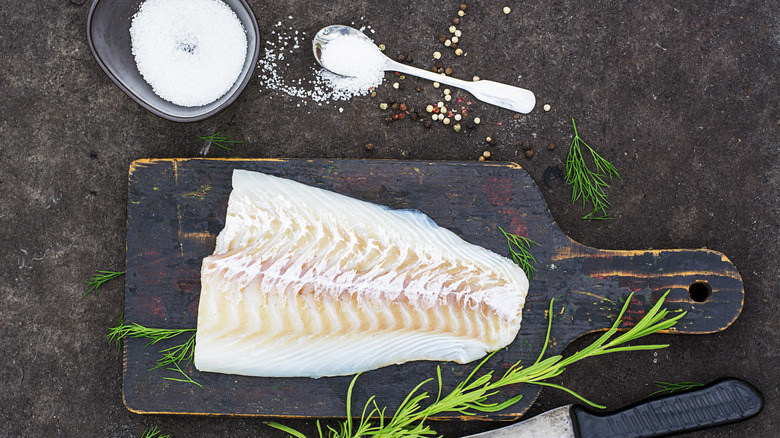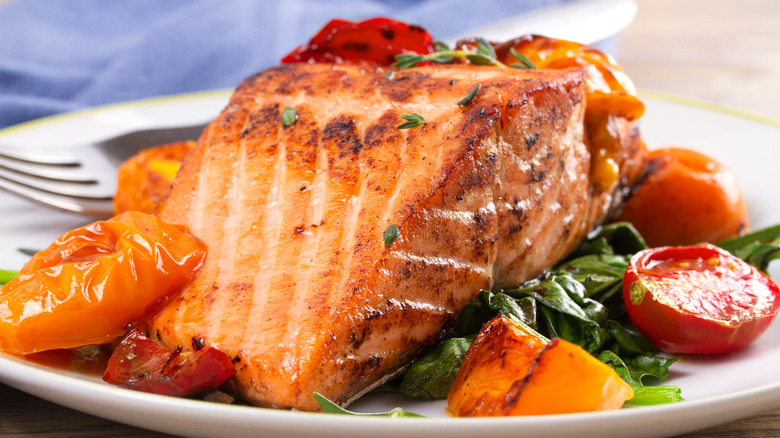For Perfectly Seasoned Fish, Timing Is Everything
When most people hear the term seasoning, they usually envision a cabinet full of dried herbs and spices. In the culinary world, however, seasoning typically means just salt. The goal of seasoning food is to enhance its natural flavor — not to cover or change it, per BCcampus. And what seasoning does the best job at that? Salt.
Fish is inherently finicky to cook. Anyone who's ever attempted the delicate flip of a fillet has undoubtedly been left with a layer stuck to the pan and half the meat on the spatula at some point. In order for the Maillard reaction to occur, which is the beautifully browned sear that allows for an easy flip, the surface of the protein needs to be dry (via Cook's Illustrated). Moisture is fundamental to cooking fish and salt is at the heart of governing the levels of protein.
High-quality fresh fish only needs a little bit of salt to draw out its natural flavor. When you happen to add that salt is what matters most. Why?
The science behind salting
If you can transport yourself back to middle school science class, you may recall the terms osmosis and diffusion. Turns out that lecture did not go to waste — it's the exact science behind how salting and cooking protein can affect its texture and taste. Salting a piece of protein draws moisture out of the meat, thanks to the process of osmosis. The water moves from inside the meat cells to the outside. Osmosis is responsible for water moving from areas of lower salt concentration to higher salt concentration (via Stella Culinary).
Salting too far in advance will draw out that moisture from the flesh of the fish, in turn drying out the meat and inhibiting any browning of the surface during cooking. Most fish are composed of 60-82 percent water, per Brittanica, making them a prime target for this salty scientific experiment to occur.
In addition, salt has the power to denature protein. Meaning it changes the structure of the protein bonds within the piece of fish. This can result in a much tougher texture if done too far in advance of cooking, per Popular Science.
When to salt fish
There are several factors to account for concerning the ideal time to season a piece of fish — too much too soon and you'll end up with a dry and mushy piece of fillet, instead of firm and flaky, per Saveur.
Additionally, the fat content of the fish comes into play. Fat acts as a barrier to water movement between cells, making fattier types of fish much slower to lose any moisture once they've been seasoned. Some popular fattier fish include salmon, albacore, swordfish, and mackerel, which may be a little more forgiving in terms of altered texture if you salt them earlier on in the cooking process. Saltwater fish species, especially, do not require a ton of salt — if any — per the Los Angeles Times.
Bottom line? If you want a beautifully seared, moist, and flaky fillet of fish on your plate, it's best to wait until it's out of the pan. A sprinkle of salt post-cooking is often the way to go.


